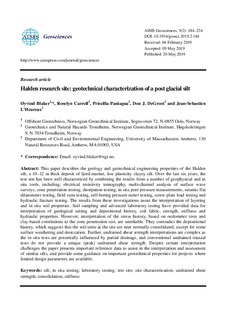| dc.description.abstract | This paper describes the geology and geotechnical engineering properties of the Halden silt; a 10–12 m thick deposit of fjord-marine, low plasticity clayey silt. Over the last six years, the test site has been well characterized by combining the results from a number of geophysical and in situ tools, including; electrical resistivity tomography, multi-channel analysis of surface wave surveys, cone penetration testing, dissipation testing, in situ pore pressure measurements, seismic flat dilatometer testing, field vane testing, self-boring pressure meter testing, screw plate load testing and hydraulic fracture testing. The results from these investigations assist the interpretation of layering and in situ soil properties. Soil sampling and advanced laboratory testing have provided data for interpretation of geological setting and depositional history, soil fabric, strength, stiffness and hydraulic properties. However, interpretation of the stress history, based on oedometer tests and clay-based correlations to the cone penetration test, are unreliable. They contradict the depositional history, which suggests that the soil units at the site are near normally consolidated, except for some surface weathering and desiccation. Further, undrained shear strength interpretations are complex as the in situ tests are potentially influenced by partial drainage, and conventional undrained triaxial tests do not provide a unique (peak) undrained shear strength. Despite certain interpretation challenges the paper presents important reference data to assist in the interpretation and assessment of similar silts, and provide some guidance on important geotechnical properties for projects where limited design parameters are available. | |
